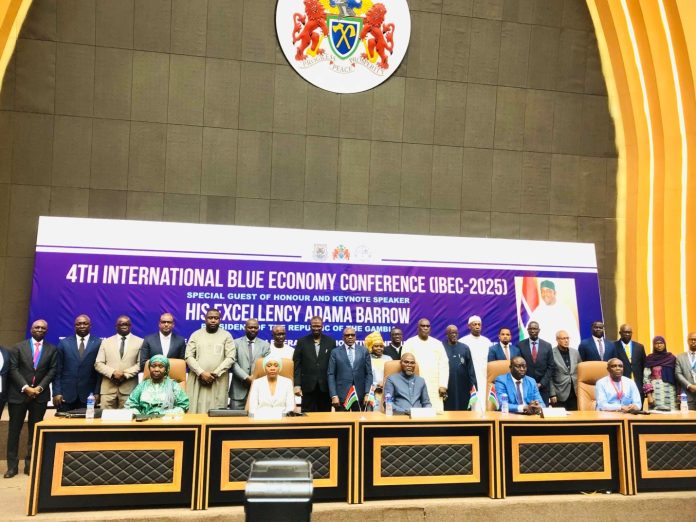By Mariama Marong
The 4th International Blue Economy Conference (IBEC 2025) is underway in Banjul from 19 to 21 February 2025.
Held at the Sir Dawda Jawara International Conference Centre, the three-day event brings together experts in the Blue Economy sector to explore sustainable maritime development and security.
The conference is organized by the Regional Maritime University (RMU) in collaboration with the Dar Es Salaam Maritime Institute (DMI) under the auspices of The Gambia’s Ministry of Transport, Works, and Infrastructure. Themed “Harnessing The Blue Economy: Leveraging Innovative and Sustainable Development,” the conference aims to promote the innovative and sustainable use of oceanic resources for economic growth, maritime security, and environmental protection.
The conference was attended by The Gambia’s Vice President Muhammed B.S. Jallow, cabinet ministers, members of academia, international ambassadors, and both national and international delegates.
Delivering the keynote address, Vice President Jallow described the conference as timely and essential for advancing the Blue Economy. He emphasized the crucial role that natural resources such as rivers and oceans play in the sustainable development of nations.
“The Blue Economy is uniquely significant to our government as it ensures the sustainable use of ocean resources for economic growth, improved livelihoods, and job creation, while also preserving the health of marine ecosystems,” said Vice President Jallow.
He highlighted that oceans are not just vast bodies of water but the lifeblood of the planet.
“Covering more than 70% of the Earth’s surface, oceans provide food, livelihoods, and opportunities in abundance,” he said.
Jallow warned that new global economic trends and modern lifestyles are putting immense pressure on marine resources. He stressed that without deliberate policies to address these challenges, Africa will continue to benefit less from its maritime resources.
“If we do not devise well-designed policies to holistically address the numerous concerns within this sector, we will not fully capitalize on the benefits of the Blue Economy. Our policies must reflect a deeper spirit of cooperation,” he stated.
He further expressed The Gambia government’s commitment to leveraging opportunities within the Blue Economy to drive socio-economic development.
Ebrima Sillah, Minister of Transport, Works, and Infrastructure, underscored the importance of the Blue Economy for economic sustainability. He called for collective responsibility in protecting marine resources.
“As Africans, let’s stand tall with strong conviction and an unstoppable urge to navigate the uncharted waters of the future using vessels, boats, and canoes paddled by the Blue Economy. The winds of change blow strong, and the tides of progress push us forward unhindered,” said Minister Sillah.
He stressed the mission to harness the Blue Economy by integrating maritime safety, climate change actions, and technological advancements to maximise the potential of oceanic and water-based resources.
“The opportunities are as vast as the ocean itself. Imagine the untapped potential that the Blue Economy offers Africa, with its 38 coastal and island states and an estimated coastline of over 47,000 km,” he added.
Dr. Jethro W. Brooks, Vice Chancellor of the Regional Maritime University, emphasized the need for strategic collaboration in fostering sustainable development through the Blue Economy.
“It is essential to promote investment in this sector, reflecting a productive and prosperous future for all. Rivers and oceans provide food and livelihoods for millions globally, and it is crucial to foster knowledge and research to ensure sustainability,” said Dr. Brooks.
He urged African countries to strengthen research and innovation, highlighting the role of universities in promoting sustainable livelihoods through education and technological advancements.
Ingrid Olga Ghislaine Ebouka Babackas, Minister of Transport in the Republic of Congo, acknowledged the significant progress that the Blue Economy has made in advancing sustainable development.
She encouraged African nations to maximize the benefits of their oceanic resources, while also addressing pressing challenges in both air and land transportation.
As discussions continue at the conference, stakeholders are expected to develop actionable strategies to strengthen Africa’s Blue Economy, ensuring its role in driving economic resilience, environmental sustainability, and global maritime security.


















